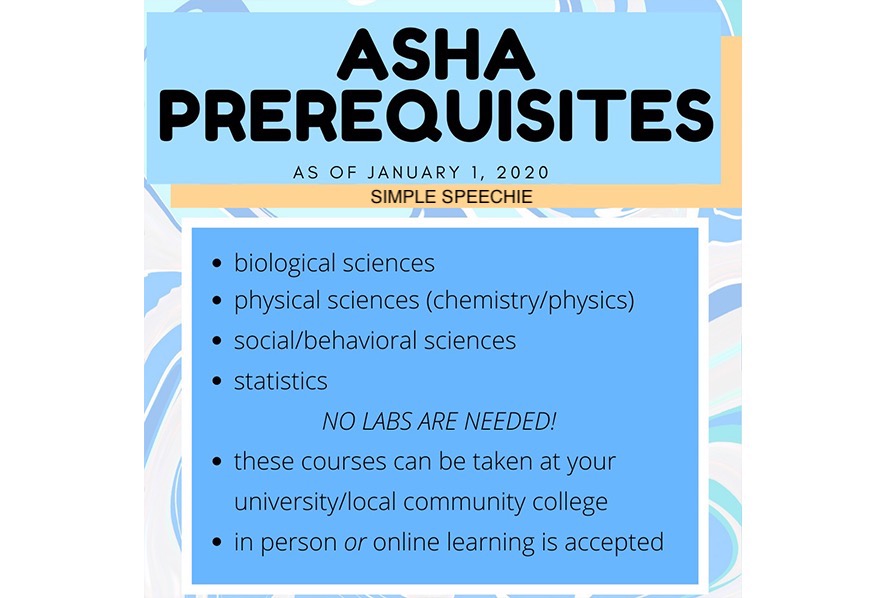
ASHA prerequisites involve 4 basics: biological sciences, physical sciences, social/behavioral sciences, and statistics. You can typically meet these requirements during their undergraduate degree, but if not, you can take them from any accredited institution. These courses may not be directly related to SLP, but they build a foundation of understanding of it.
According to ASHA, “if you are found to be deficient in any coursework, including the above-listed prerequisite courses, that coursework must be completed at an accredited college or university program prior to beginning your clinical fellowship.”
Contrary to popular belief, you do not need a lab! Take it from me, I found out the hard way by taking a “for science majors-only” course at the time, after not taking a science course since high school. There are so many options that you can take that are related to gaining relevant knowledge to the field of SLP.
As an out-of-field major, I decided to pursue a degree in Psychology with a concentration in Human Development. Being a Human Development major allowed flexibility as I was able to focus on ASHA’s requirements and find relevant psychology courses to gain knowledge about the populations that I would be working with as a future SLP.

Biological sciences:
- I took a course called “Brain and Behavior” to fulfill this requirement. Understanding brain functioning and the cognitive system is vital for speech and language development, especially for the traumatic brain injury population.
- Most graduate programs require some type of neurocognitive/neurolinguistic course. I was able to get prior exposure and a baseline understanding by learning how the brain is organized, how its neural networks communicate throughout the body, and the correlation between altered functioning due to traumatic brain injury/disease.
- If there is a similar course like this offered at your institution, I highly recommend taking it!
Physical sciences:
- To fulfill my physical sciences course, I took a course called “How Things Work.” It sounds so simplistic, but it allowed me to develop an understanding of the physics of everyday objects and experiences! It was an easy, yet interesting course that challenged me to think in different ways. I got to use 3D printers, develop environmentally friendly projects, and create an automatic alert to water plants!
Social/behavioral sciences:
- To complete my concentration requirements of human development, I took the following courses: child psychology, adolescent psychology, social psychology, abnormal psychology, behavioral problems in children, brain & behavior, and theories of learning & cognition.
- It is essential to understand the populations you will be working with as a future clinician. Taking courses similar to these will give you an understanding about why a client may be behaving the way they are. It may be that a client is trying to communicate through their behavior, express their emotions, or an underlying factor may even be present.
- I gained evidence-based knowledge during these courses about a wide range of behaviors, typically developing milestone, and learned so much through peer-reviewed research and the DSM-5.
- Research has shown an interaction between behavior and speech. A past supervisor once told me, “progress cannot be seen without being able to control behavior”…and this is where multidisciplinary collaboration comes into play. From my knowledge, behavior and speech essentially go hand in hand, thus, it is essential to understand.
Statistics:
- As a prior business major, I took business statistics which luckily met this requirement. Within this course, it covered the basic concepts of data analysis. It’s the science of learning from data, and of measuring, controlling, and communicating uncertainty; and it thereby provides the navigation essential for controlling the course of scientific and societal advances, as described on ASHA’s website. It sounds more intimidating than it is, but I found it to be a relatively easy course.
Here are some of my reccomendations to complete your ASHA prerequisites:
- If you have time over the summer take it at a community college! It is much cheaper and the coursework is just as applicable as any other university.
- Fill up your general education courses with these requirements!
- Go in with a positive mindset! Although these courses are not SLP-related, they build the foundation of understanding.






HI, I'M TAMMY!
I’m a graduate student at Northwestern University, the top 2 ranked speech-language pathology program.
I created this website to help students navigate their way through their educational journey by sharing my own story, providing resources, and advice. I aspire to empower students, resonate with them, and help them be successful.